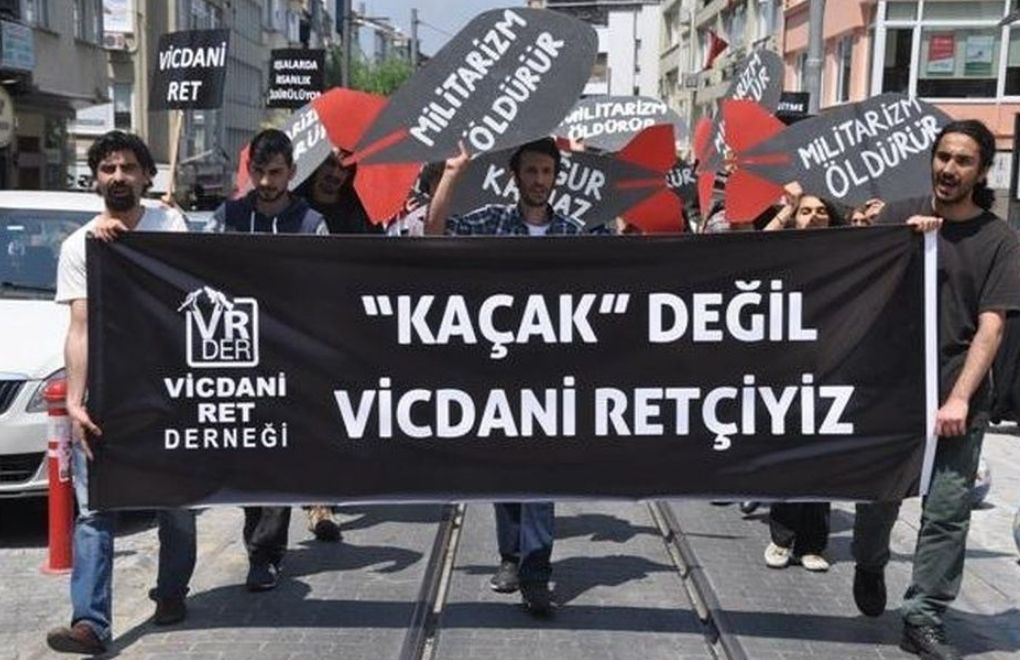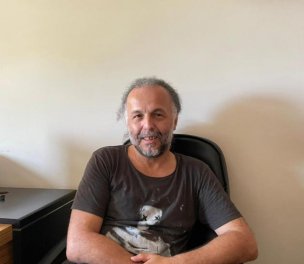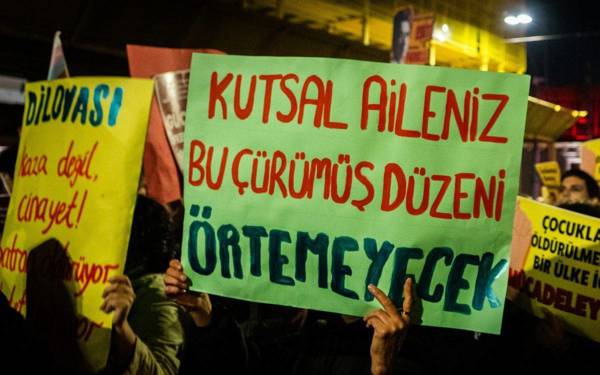Click to read the article in Turkish
"I am 37 years old, and I have been a professional tourist guide for about seven years. I declared my conscientious objection in May 2013.
"I am a conscientious objector because military service, organized violence, taking orders and giving orders, marching marches, singing anthems, that others answer the question of whether it is right to kill a person or not, which is not compatible with natural flow of life bothered me. It still does.
"I think I got my first administrative fine just 1 week later I had declared my objection, I deserted the army.
"It continued like this after that. Official records have become a part of my life; at the exits of subway stations, streets, cafes, hotels, and demonstration venues, I would often have an official report in hand.
"As most of us know, there is no penalty for being a conscientious objector in Turkey, but there are sanctions. They apply that sanction as follows. Each official report corresponds to a certain monetary fine, then a lawsuit is filed against you for not paying those fines.
"At some point I felt compelled to complete the obligation for military service by payment. Until 2015, I was able to sustain my own life with different alternative economic models.
"However, when another person - our daughter - joined our lives, it became increasingly difficult to survive in metropolitan conditions..."
Click here for the full report
No right of conscientious objection in Turkey
The report "Conscientious Objection to Military Service in Turkey", prepared as part of the "Campaign to Support the Right to Conscientious Objection in Turkey" was released yesterday (July 5).
Published by the Conscientious Objection Association and prepared by Dr. Mine Yıldırım and Hülya Üçpınar, the report shares detailed information and findings about the violations of rights and juridical processes experienced by the conscientious objectors in Turkey.
"The Conscientious Objection to Military Service in Turkey" was prepared by interviewing 18 conscientious objectors and lawyers. Turkey is reportedly the only country within the Council of Europe which does not recognize the right to conscientious objection to military service.
The report examines the cases of 85 conscientious objectors. As indicated in the report, to date, conscientious objectors have made 45 separate applications to the Constitutional Court, Turkey's top court.
The report has found that conscientious objectors whose cases are included in the report have been fined a total of 575,517 Turkish Liras (approximately 55,815 Euros) combined together. The report includes information and stories from conscientious objectors including anti-militarists, Jehovah's Witnesses, and those objecting based on their Islamic belief.
Some highlights from the report are as follows:
'It leads to "civil death"'
"Although the right to conscientious objection to military service is protected under the European Convention on Human Rights (ECHR) and the International Covenant on Civil and Political Rights (ICCPR) as part of the right to freedom of thought, conscience and religion, conscientious objection in practice leads to 'civil death' in Turkey.
It means that conscientious objectors face multiple rights violations, including their right to vote and to be elected, freedom of movement, right to education, freedom to work, and prohibition from public rights, and aggravated execution, which are under fundamental rights and freedoms.
'Turkey is obliged to grant this right'
"As being party to both ECHR and ICCPR, Turkey is obliged to recognize the right to conscientious objection to military service as part of its commitments under international law. It's also Turkey's obligation according to her own constitution whose Article 24 protects freedom of religion and conscientious, and whose Article 90 recognizes the superiority of international law in matters related to fundamental rights and freedoms when there is a conflict between the national and international law.
Yet, the Turkish government insists on not recognizing the right to conscientious objection as military service remains compulsory for men aged 20-41.
"The report includes recommendations to the Turkish Government for a basic legislation for conscientious objection, as well as to the International mechanisms for monitoring human rights violations in Turkey, which cover the 'civil death' processes and litigation processes faced by conscientious objectors and are prepared by field experts for solutions when dealing with fundamental human rights violations."
RecommendationsWithin this context, the report offers the following recommendations: It is recommended that; – conscientious objection to military service be recognized as a constitutional right, without delay, to ensure that legislation on conscientious objection does not come into conflict with other legal regulations and that such regulation is not made open to, possibly restrictive, interpretations of the executive and judicial bodies; – legislation on conscientious objection to military service should be drafted in compliance with international human rights law as enshrined in the United Nations, the Council of Europe and the European Union human rights instruments; – an independent and impartial decision-making body to examine conscientious objection claims is established – in compliance with international human right law standards, in particular taking into account the requirement not to discriminate between conscientious objectors on the basis of the nature of their religions or belief; – measures, that are compatible with international human rights law, are taken to provide a mechanism for the conscientious objectors who declare themselves as "total objectors"; – measures are taken to provide alternative service for those conscientious objectors who request it – various forms of alternative service compatible with international human rights standards; key features of the legislation should include the mechanism for determining the status of conscientious objection should be structured accordingly, and that any service that can be provided as an alternative to conscientious objection genuinely civilian in nature, neither deterrent nor punitive and non-discriminatory in effect; – all criminal proceedings against conscientious objectors are ended, compensation is provided, all convictions regarding conscientious objection in the criminal records for disobedience, draft evasion, desertion, public statements, are expunged; – official records are prepared in a detailed manner without missing information, in line with national procedures. Official records are entered and maintained on the national database and are accessible in e-devlet (e-state) system; – statistics are kept on conscientious objection applications including the number of conscientious objectors, on monetary fines and criminal investigations, and convictions delivered in connection to conscientious objectors and shared with the public; – measures are taken to ensure that the applicants are free from the risk of further prosecution and obligation of compulsory military service and can fully enjoy their political, civil, economic, social and cultural rights. To this end, domestic laws, in particular the Law on Conscription, the Military Criminal Law, the Law on Civil Servants, Criminal Code, are reviewed with a view to remove all restrictions imposed on conscientious objectors in the exercise of the rights to be elected and to elect, right to education, opportunities to earn a living; – the Constitutional Court – follows ECtHR jurisprudence which recognizes the right to conscientious objection to military service as a fundamental human right, takes into account ECtHR judgments on this issue and decides on the numerous individual applications pending at the AYM, without delay; – examines interim measures in detail and treats the issue in a manner that would prevent further harm to conscientious objectors; – Regular training is provided for judges and prosecutors on international human rights obligations pertaining to the right to conscientious objection to military service to help ensure the compatibility of the domestic judicial proceedings with applicable international human rights standards; – regular training is provided for relevant public authorities in the Ministry of Interior, in particular officers involved in GBT, General Information Collection and stop & checks. To international human rights compliance control mechanisms: – Keep compliance control of the right to conscientious objection to military service on relevant agenda including the CoE Committee of Ministers, UN Human Rights Committee, UN Special Procedures and the UPR; – Follow up the implementation of UN HRC Opinion on Atasoy and Sarkut v. Turkey and UPR recommendations; – CoE Committee of Ministers, – continue to keep the Ülke group of cases on enhanced supervision track ask the Turkish authorities to report on the effectiveness of the Constitutional Court individual application mechanism to protect conscientious objectors to military service; – ask the Turkish authorities to report on the effectiveness of the Constitutional Court individual application mechanism to protect conscientious objectors to military service; – ask the Turkish authorities to provide information on how and to what extent the rights of conscientious objectors to education, security of persons, protection of property, right to vote and opportunities to earn a living are impacted due to evader/deserter status in law; – ask Turkish authorities statistical information on conscientious objectors to military service. |
(EMK/SD)
















